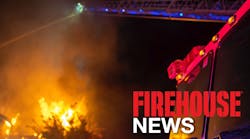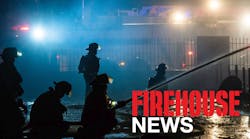Last week, I received an email from Billy Goldfeder on the two St. Louis rigs that collided while going through an intersection enroute to an emergency. As Billy said, there was something positive that came out of this video - no serious injury as the firefighters in both rigs were wearing seatbelts.
"Personal accountability" and "adherence to safety" are words that should be emblazoned on every piece of turn-out gear. Yes, we have made strides in these areas, and we should be profuse in our acknowledgment and approbation towards those members of the fire service who have demonstrated the courage to hold their peers to highest standards of accountability and safety. And while a number of deaths and injuries can be avoided, risk is inherent to the profession and firefighters do die even though they did all the right things.
Why do I bring this up when the focus of my article is on Washington politics? Because the Assistance to Firefighters Grant Program (FIRE Act) is up for reauthorization next year and we need to illustrate to Congress how $4 billion in funding has improved the overall readiness of our nation's fire and emergency services.
Eight years ago, when the national fire service organizations were working together with Congressman Bill Pascrell on developing the FIRE Act, we all agreed that firefighter health and safety would be one of the primary messages of our lobbying efforts to Congress. Many firefighters lacked the proper training and equipment to protect them when responding to calls. Staff shortages were plaguing both career and volunteer departments. While local and state governments were providing the primary funding for local departments, the federal government was providing nominal support despite the growing demands of fire departments to protect so much of our national infrastructure.
In 2002, the United States Fire Administration and the National Fire Protection Association conducted a needs assessment. For years, the national organizations relied on anecdotal data to help convey the need for greater support. The needs assessment put the problem in stark and easy to understand terms. We used the information any time we met with members of Congress or when our leaders testify in committee hearings.
Here it is 2008 and Congress has approved $4 billion in funding for the FIRE Act program. Next year Congress will reauthorize the FIRE Act and there are no guarantees that Congress will be as generous with the program has they have been for the past eight years.
We are facing a major economic crisis and tough decisions will have to be made next year on both ends of Pennsylvania Avenue to restore fiscal discipline to the budget process. When I first arrived in Washington 23 years ago, I recall how the Reagan Administration was chastised for deficits that exceeded $100 million. I recently read in one political journal that the 2009 budget deficit could be in the range of $1 trillion. And despite this ominous forecast, we have two presidential candidates who talk about offering tax cuts while adding billions in spending for new government programs.
So, my message to the fire service is to spend your FIRE grant dollars very prudently to ensure it will have an impact on making your communities safer. Don't ever think of the program as an entitlement program that will always be around for the fire service. While Ronald Reagan once quipped, "Government programs, once launched, never disappear," many federal programs have experienced severe funding cuts in recent years. Just ask the law enforcement organizations about the COPs hiring program. Funded at $1.3 billion in 1998, the program is on life support, having received $20 million this year.
Next year, we will be counting on you to help us make the case on Capitol Hill to sustain this program and the Staffing for Adequate Fire and Emergency Response (SAFER) grant program. As we have for the past eight years, we will advocate the merits of the program before members of Congress and Administration officials and argue against the notion that the federal government should not be funding local fire departments.
Your job is to make sure that your local members of Congress understand why FIRE and SAFER play a critical role in protecting you, your peers and the citizens you have sworn to protect. You need to convince them that the $4 billion awarded to fire departments across the country was a sound investment in public safety and that additional funding is still needed. You can do that by making sure that the funds awarded to your departments address needs, not wants, and by taking on a greater responsibility to reduce the actions and decision-making that jeopardize the safety and wellness of you and your peers.
Working together, we can convince Congress to continue funding these programs to benefit the next generation of firefighters.
Related Links
Register now for the 21st Annual National Fire and Emergency Services Dinner and Seminars, to be held April 1 - 2, 2009, in Washington, D.C.BILL WEBB, a Firehouse.com Contributing Editor, is the Executive Director of the Congressional Fire Services Institute (CFSI). Established in 1989, CFSI is a nonprofit, nonpartisan policy institute designed to enhance Congressional awareness about the concerns and needs of the fire and emergency services. In his capacity, Bill works closely with members of Congress and fire service leaders on developing federal legislation to improve the readiness of our nation's fire and emergency services. Previously, he served in the first Bush Administration as Director of Advance at the U.S. Departments of Education and Labor, traveling across the country and abroad organizing events for the Secretaries. To read Bill's complete biography and view his archived articles, click here.





